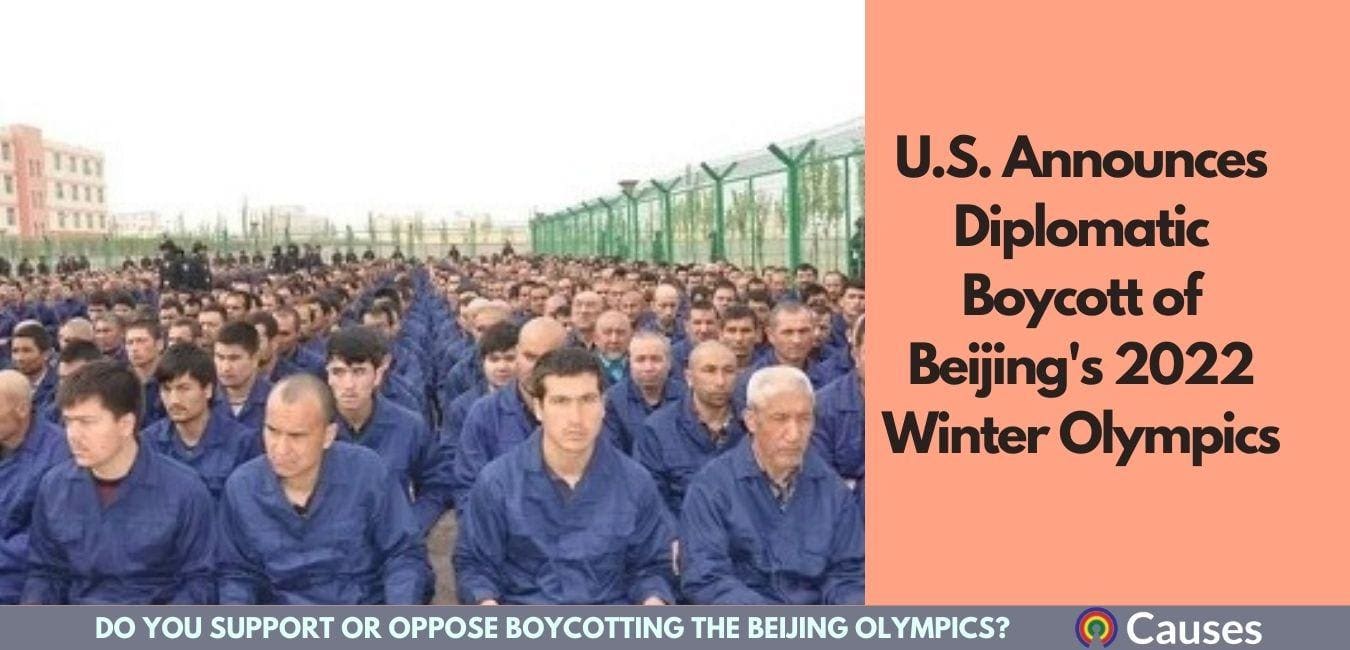
Australia, Britain, & Canada join U.S. diplomatic boycott of Beijing Winter Olympics
Do you support or oppose the U.S. diplomatic boycott of China’s Beijing Winter Olympics?
Written by Eric Revell, Countable News
UPDATE 12/8/21
- Three of America's closest allies ― Australia, Britain, and Canada ― have announced that they will join the U.S. in a diplomatic boycott of the Beijing Winter Olympics next year over China's human rights violations and its belligerence toward Taiwan.
- Australian Prime Minister Scott Morrison announced the move Wednesday and said, "I'm doing it because it's in Australia's national interest... It's the right thing to do."
- British Prime Minister Boris Johnson said Wednesday, "There will be effectively a diplomatic boycott of the Winter Olympics in Beijing, no ministers are expected to attend and no officials." He added, "I do not think that sporting boycotts are sensible and that remains the policy of the government."
- Canadian Prime Minister Justin Trudeau explained, "I don't think the decision by Canada or by many other countries to choose not to send diplomatic representation to the Beijing Olympics and Paralympics is going to come as a surprise to China. We have been very clear over the past many years of our deep concerns around human rights violations."
- More U.S. allies may join in the diplomatic boycott in the weeks ahead.
The original article appears below.
What’s the story?
- The Biden administration on Monday announced that the U.S. will undertake a diplomatic boycott of the Beijing Winter Olympics in light of China’s genocide and crimes against humanity targeting Uyghur Muslim minorities in the Xinjiang region. The Beijing Olympics begin on February 4, 2022.
- White House Press Secretary Jen Psaki explained the decision at a press conference:
“The Biden administration will not send any diplomatic or official representation to the Beijing 2022 Winter Olympics and Paralympic Games given the [People’s Republic of China’s] ongoing genocide and crimes against humanity in Xinjiang and other human rights abuses. The athletes on Team USA have our full support. We will be behind them 100% as we cheer them on from home. We will not be contributing to the fanfare of the Games. U.S. diplomatic or official representation would treat these Games as business as usual in the face of the PRC’s egregious human rights abuses and atrocities in Xinjiang. And we simply can’t do that.”
- A diplomatic boycott allows U.S. athletes to compete at the Olympic and Paralympic Games but aims to deny China the propaganda opportunity of U.S. dignitaries attending the games in Beijing amid the Chinese Communist Party’s ongoing genocide and persecution of the Uyghurs.
- The U.S. Olympic and Paralympic Committee previously expressed opposition to an athlete boycott, which said past boycotts “only hurt athletes who have trained for their entire lives for this opportunity to represent their country.”
- America’s diplomatic boycott may be joined by other U.S. allies and partners that share an interest in holding China accountable for its crimes against humanity in Xinjiang, in addition to its belligerence against pro-democracy protesters in Hong Kong, the nation of Taiwan, and in the South China Sea.
What happened in past Olympic boycotts?
- The 2022 Winter Olympics in Beijing isn't the first time the Olympic Games involved a discussion of a boycott over the host nations’ conduct, although there has only been one other time that the U.S. followed through with a full boycott (as opposed to a diplomatic boycott).
- Moscow was slated to host the 1980 Summer Olympics just months after the Soviet Union invaded Afghanistan in 1979. President Jimmy Carter threatened to boycott the Summer Olympics unless the Soviet Union withdrew, which it did not do.
- While detractors argued the boycott wouldn’t result in the USSR withdrawing, the U.S. went ahead with the boycott and was joined by over 60 other countries. While the U.S., Japan, and West Germany engaged in a full boycott of the Moscow Olympics, the United Kingdom, France, and Australia allowed athletes to decide individually whether they would compete.
- Many of the athletes from nations that boycotted the 1980 Moscow Olympics competed at the “Liberty Bell Classic” which was held in Philadelphia, Pennsylvania, and financed by $10 million from Congress.
- In 1984, Los Angeles was the site of the Summer Olympics and the Soviet Union boycotted the games in retaliation, and instead hosted the “Friendship Games” with Soviet athletes joined by competitors from North Korea and six other Eastern Bloc communist satellite nations.